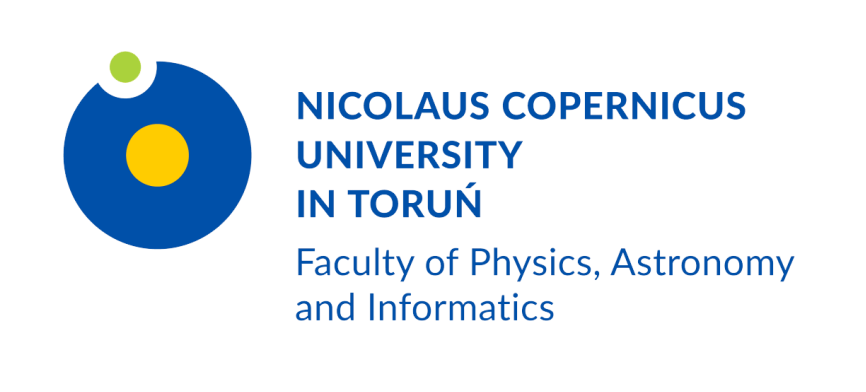The Institute of Engineering and Technology (INT) is part of the Faculty of Physics, Astronomy and Informatics of Nicolaus Copernicus University in Toruń. As a result of the reorganisation of the Faculty, the Institute started its scientific, research and teaching activities from 1 October 2019. INT is composed of employees of two departments:
Scientific research conducted at Department of Automation and Measurement Systems, due to its structure and staff, concerns both automation and robotics and measurement systems. In particular, the following research directions can be distinguished:
- Control methods in electric drives and power electronic converters are characterised by high dynamics, reliability, and efficiency.
- Use of artificial intelligence elements (artificial neural networks) in control and estimation algorithms.
- Numerical control of multi-axis machines.
- Motion control of machines with linear servo drives.
- Motion processor.
- Digital phase loop in time-interval measurement systems.
- Development of multithreaded real-time applications for embedded systems (SoC).
- Digital to Time converters.
- Application of time interval measuring systems to the construction of converters of non-electrical quantities.
- Correlation methods in the measurement of small amplitude signals.
- Sensors of security systems, “smart” tags.
- Current sensors for applications in power electronic converters.
- Time interval processor.
- Research related to modern materials engineering aimed at developing technologies associated with the production of prototype thin-film structures, applicable in the construction of modern devices such as sensors, cheap photovoltaic cells, light sources, disposable electronics
In turn, scientific research in the Department of Applied Informatics is conducted on the borderline between such fields as computer science, artificial intelligence, bioinformatics, cognitive science or neuroscience in general. Much of the research is conducted in the Neurocognitive Laboratory, located in the Interdisciplinary Centre for New Technologies, often with the participation of psychologists, cognitive scientists, medics and even philosophers. The main research directions of KIS include:
- Meta-learning in machine learning and artificial neural networks.
- Exploration and development of new algorithms for machine learning, deep learning and neural networks. Optimisation of the computational complexity of such algorithms.
- Analysis of large structured data sets and investigation of methods for automatic extraction of relevant and interpretable features.
- Algorithms for processing and analysis of audio, video and motion signals applied to intelligent data analysis systems.
- Development of algorithms to study the spatial structure of proteins their dynamics and functionality. Searching with machine learning for features characterising large molecules (proteins, RNA and DNA molecules).
- Searching for the origins of cognitive processes in the brain by analysing electrophysiological data from electroencephalography and magnetoencephalography and neuroimaging data from functional magnetic resonance using mathematical methods and experimental verification.
- Investigation of neurodynamic processes occurring in the brain using computer simulations and non-linear methods to analyse electrophysiological data. Development of mathematical methods for such studies. Investigating the effects of training on neuroplastic changes in the brain using network models in neuroscience.
- Computer models of neuropsychiatric disorders, development of new diagnostic methods and neurofeedback in various psychiatric disorders. Effects of biofeedback training based on heart rate variability and new EEG analysis methods on the dynamics of attention processes, divergent thinking, creativity and intelligence.
- NeuroPerKog: development of phonemic hearing and working memory in infants and children, the impact of stimulation on the speed of language acquisition in children with hearing implants.
- The spectral fingerprint of the resting state of human brain areas is based on anatomical and functional atlases.
- Visualisation and analysis of high-dimensional neurodynamic systems. Development of software for analysis of dynamic systems. Computer modelling of cognitive and physiological functions of the human body.
- Computer modelling and simulation of human physiological systems.
Intelligent analysis of polysomnography results and diagnosis of respiratory diseases. - Human-computer interaction, in particular, visual interaction also for people with motor disabilities. Creation and study of therapeutic games and cognitive training.
The INT staff, having practical knowledge of an interdisciplinary nature, teach at the Faculty for students of the faculties:
- Automation and Robotics,
- Applied Computer Science,
- Technical Physics.
Their scientific and didactic activity is carried out in two locations. The first one is the Aleksander Jablonski Institute at Grudziądzka 5/7, and the second is the School of Engineering, located at Szosa Okrężna 17.

 Grudziądzka 5, 87-100 Toruń
Grudziądzka 5, 87-100 Toruń